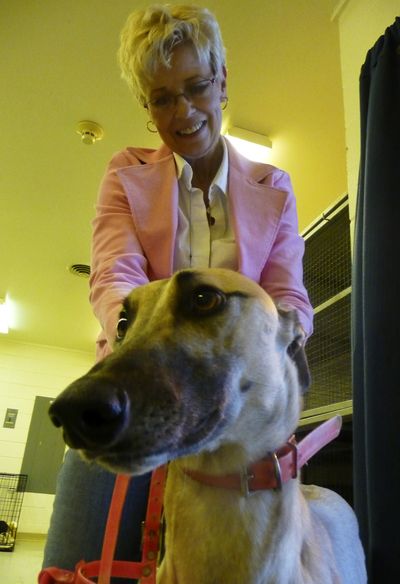Greyhounds face career change
As dog racing drops, adoption need rises

KENOSHA, Wis. – Seven dog tracks halted racing across the country last year, forcing hundreds of greyhounds into an uncertain future. With fewer tracks available for them to race, the sleek long-limbed dogs are now flooding the adoption market at a difficult time.
Economic hardships are preventing many dog lovers from adopting, or worse, forcing them to give back animals they can no longer afford to keep. Misconceptions about the breed – that greyhounds are hyperactive and crave constant stimulation and exercise – also scare away some potential owners, advocates say.
And most have spent their lives inside racetracks and kennels with little exposure to families, kids or even the most basic household activities, say greyhound lovers like Rhonda Mack, who took in two dogs from the Dairyland Greyhound Park in southern Wisconsin, which closed last week.
“You bring a dog home … They’ve never been outside the racetrack,” said the 50-year-old from Lake Zurich, Ill., who now has three greyhounds, including new additions Lexi and Jack. “They go into your house – they don’t know what a window is, they don’t know what stairs are. They walk right into windows like they aren’t even there.”
The track in Wisconsin ran its last dog race on New Year’s Eve; another in Phoenix and one in Massachusetts also ended dog racing last month, bringing the total to seven tracks that pulled the mechanical rabbit in 2009.
Though there are no precise figures, greyhound advocates estimate more than 1,000 greyhounds now need new homes. That’s in addition to the best racers, who will be sent to tracks that remain open elsewhere or to breeders.
“It is a domino effect,” said Michael McCann, president of The Greyhound Project Inc., a Boston-based nonprofit that provides support and information about greyhound adoptions. “Everything that happens in one state affects … the dog adoption effort in other states.”
The economic downturn hasn’t helped. The American Society for the Prevention of Cruelty to Animals estimates that as many as 2 million pets have been abandoned since the recession began in December 2007.
With so many dogs needing homes, Kevin Neuman of Overland Park, Kan., started the nonprofit greyhoundcentral.org, which he hopes will serve as a clearinghouse for greyhound adoption.
When Woodlands Greyhound Park in Kansas City closed in 2008, Neuman said his group found homes for some 500 dogs, including about 200 placed in adoptive homes in the area. He worries the outcome won’t be as positive for these canines.
“There are many ways for these dogs to disappear, to go to tracks that might be outside the country, in Mexico for example,” where the dogs might be run harder and get less adequate care, he said.
In Wisconsin, the Dairyland track has offered a $5,000 incentive to its kennels to find all dogs homes by Feb. 5. General Manager Bill Apgar said even if that deadline is not met, the kennel compound will remain open until all are placed.